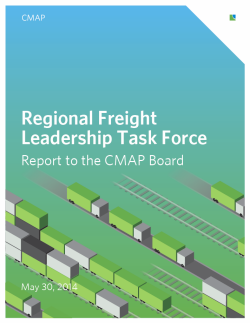Drawing on GO TO 2040, the CMAP Board convened the Regional Freight Leadership Task Force in June 2013 to explore the potential benefits of creating a Regional Freight Authority to address institutional and funding barriers affecting the freight system in northeastern Illinois. The appointment of this Task Force acknowledged the need for a higher degree of industry involvement in the regional planning process and the importance of public/private cooperation in the creation of good freight policy. The Task Force was created solely to advise the CMAP Board, and had no statutory or independent authority.
In its final report, the Regional Freight Leadership Task Force recommends a preferred scenario with three main components. The first component is to incorporate comprehensive, multimodal freight planning into the regional comprehensive plan and the second is to secure new funding from user fees to invest in the regional freight system. The third component combines the first two, harnessing the new revenues to build freight projects and fund operational programs identified in the regional plan. Consistent with the preference expressed in GO TO 2040, the Task Force's recommendations rely on existing institutions to deliver enhanced freight governance in the region; the Task Force does not recommend establishing a new, independent "Regional Freight Authority."
